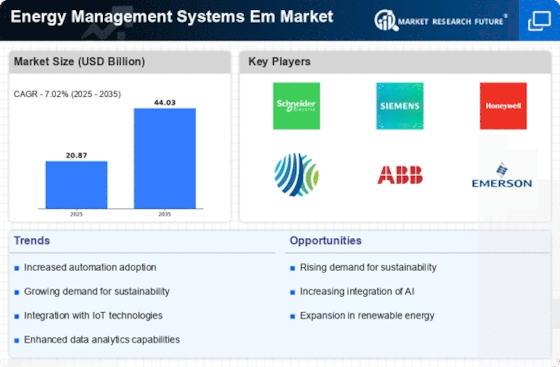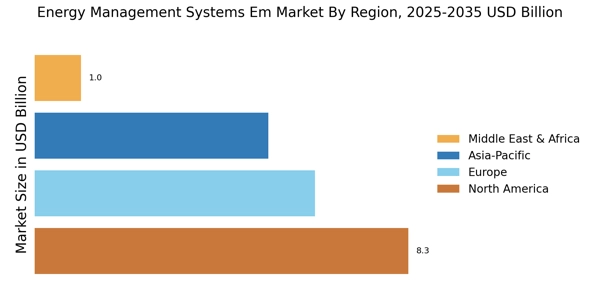Rising Energy Costs
The increasing cost of energy is a primary driver for the Energy Management Systems Em Market. As energy prices continue to rise, organizations are compelled to seek solutions that enhance energy efficiency and reduce operational costs. This trend is particularly evident in sectors such as manufacturing and commercial real estate, where energy expenditures constitute a significant portion of overall expenses. According to recent data, energy costs have surged by approximately 20% over the past five years, prompting businesses to invest in energy management systems. These systems not only help in monitoring energy consumption but also facilitate the identification of inefficiencies, leading to substantial savings. Consequently, the demand for advanced energy management solutions is expected to grow as companies strive to mitigate rising energy costs.
Technological Advancements
Technological advancements play a crucial role in propelling the Energy Management Systems Em Market forward. Innovations in IoT, artificial intelligence, and big data analytics are transforming how energy is managed and consumed. These technologies enable real-time monitoring and analysis of energy usage, allowing organizations to make informed decisions regarding their energy consumption. For instance, the integration of smart meters and sensors provides granular data that can lead to optimized energy management strategies. The market for energy management systems is projected to grow at a compound annual growth rate of over 15% in the coming years, driven by these technological innovations. As organizations seek to leverage these advancements, the demand for sophisticated energy management solutions is expected to rise.
Increased Focus on Sustainability
The growing emphasis on sustainability is reshaping the Energy Management Systems Em Market. Organizations are increasingly recognizing the importance of reducing their carbon footprint and adhering to environmental regulations. This shift is driven by consumer demand for sustainable practices and the need to comply with stringent regulations aimed at reducing greenhouse gas emissions. As a result, many companies are adopting energy management systems to monitor and optimize their energy usage, thereby enhancing their sustainability efforts. Data indicates that businesses implementing these systems can achieve energy savings of up to 30%, significantly contributing to their sustainability goals. This trend is likely to continue as more organizations prioritize environmental responsibility in their operational strategies.
Government Incentives and Policies
Government incentives and policies are significantly influencing the Energy Management Systems Em Market. Many governments are implementing programs that encourage businesses to adopt energy-efficient technologies and practices. These initiatives often include tax credits, rebates, and grants aimed at reducing the financial burden associated with implementing energy management systems. For example, certain regions offer financial incentives for companies that achieve specific energy savings targets. This support not only lowers the initial investment costs but also enhances the return on investment for energy management solutions. As governments continue to prioritize energy efficiency and sustainability, the market for energy management systems is likely to expand, driven by these supportive policies.
Growing Demand for Data-Driven Decision Making
The increasing demand for data-driven decision making is a significant driver in the Energy Management Systems Em Market. Organizations are increasingly relying on data analytics to inform their energy management strategies. By utilizing energy management systems, companies can collect and analyze vast amounts of data related to their energy consumption patterns. This data-driven approach enables businesses to identify inefficiencies, forecast energy needs, and implement targeted strategies for energy savings. The trend towards data analytics is expected to grow, with the market for energy management systems projected to reach new heights as organizations seek to harness the power of data to optimize their energy usage. This shift towards informed decision making is likely to enhance the overall efficiency and effectiveness of energy management practices.

















